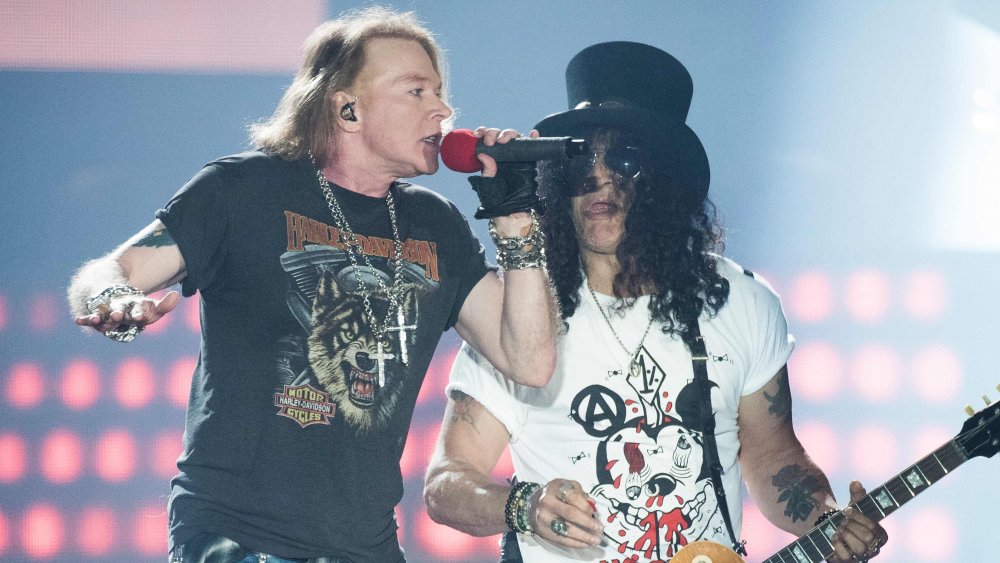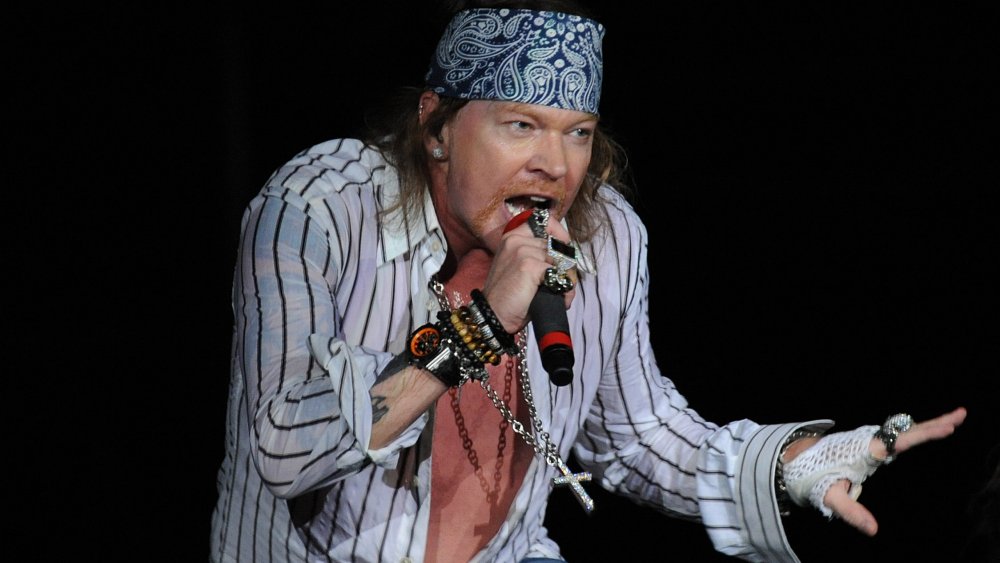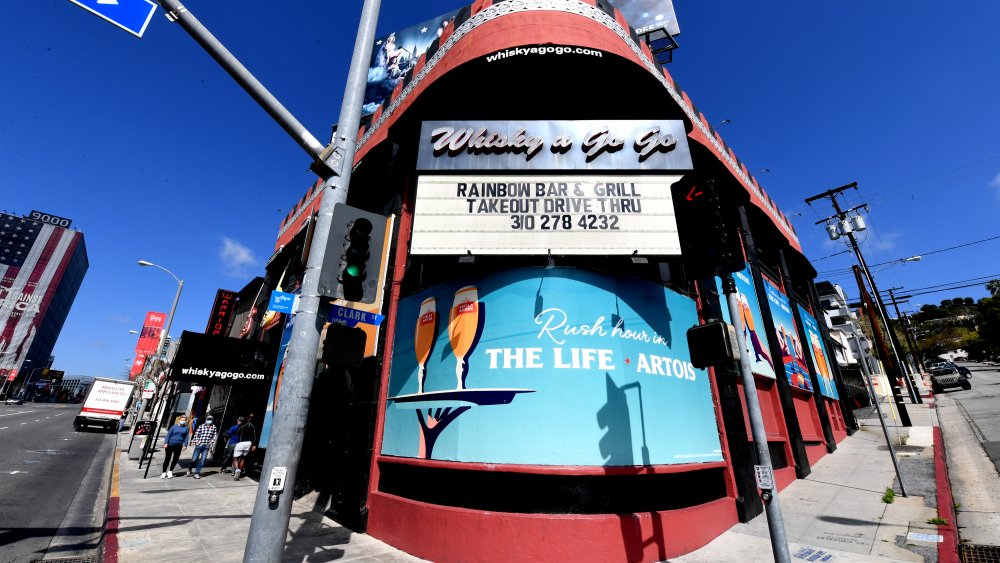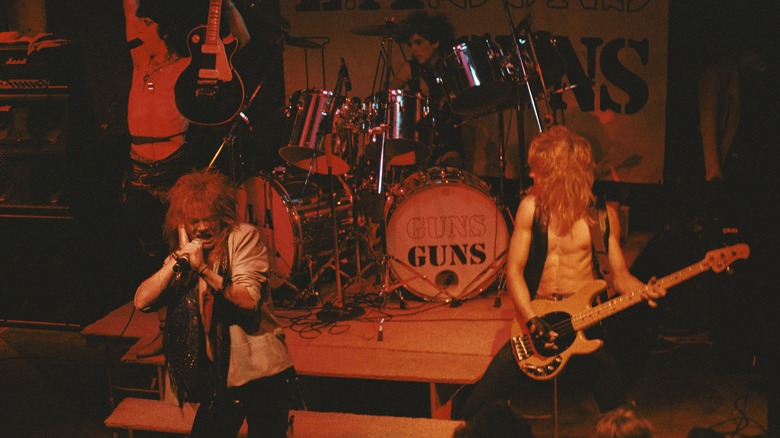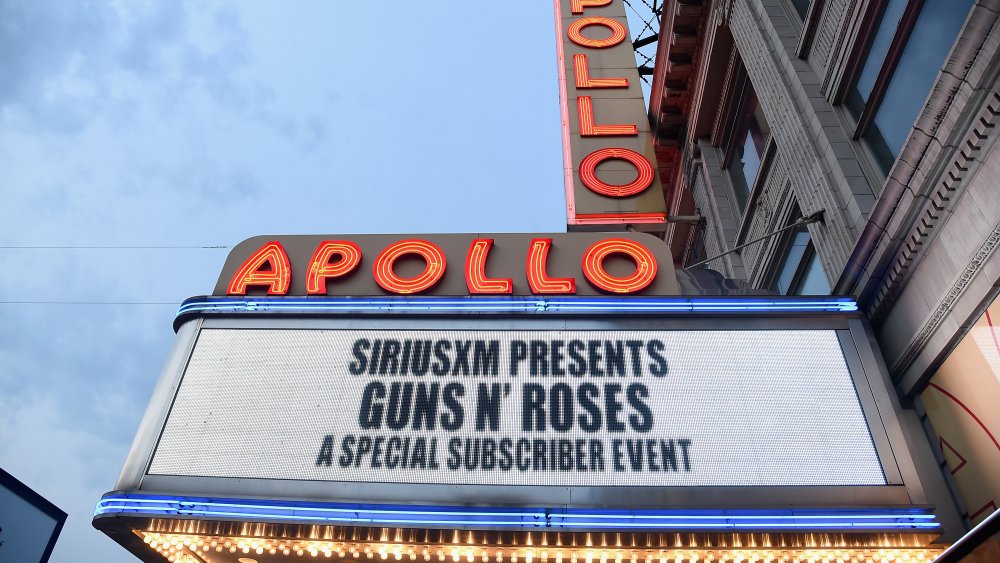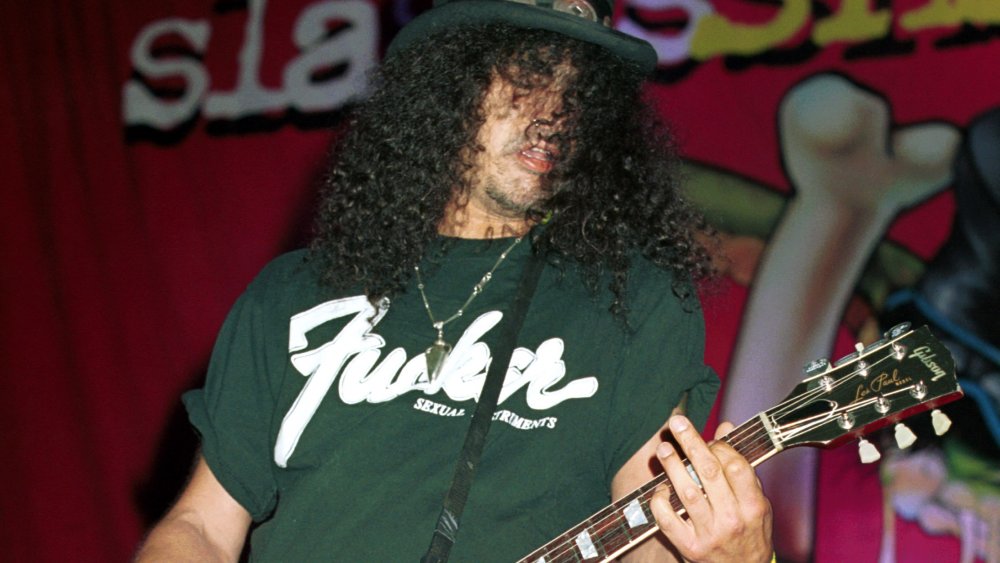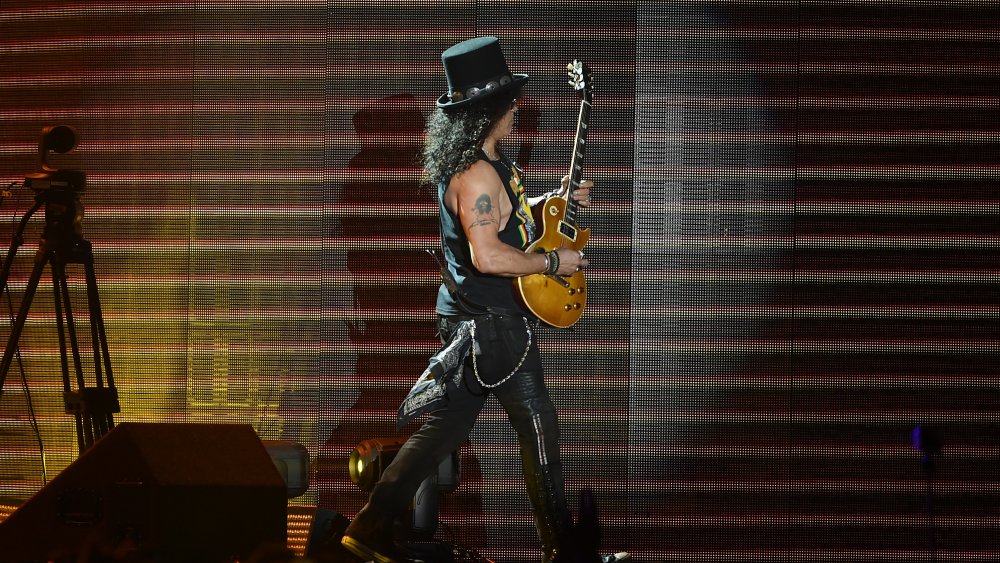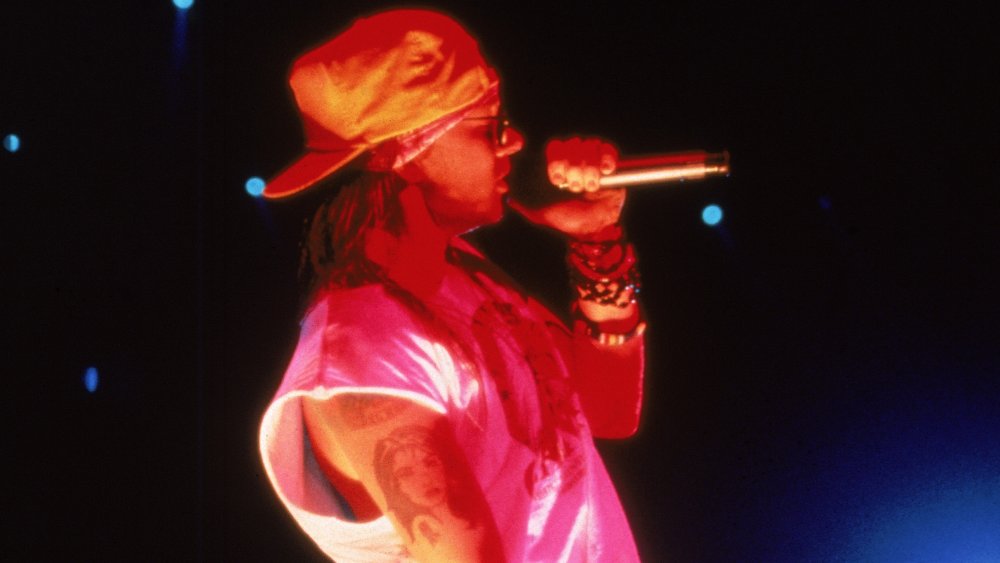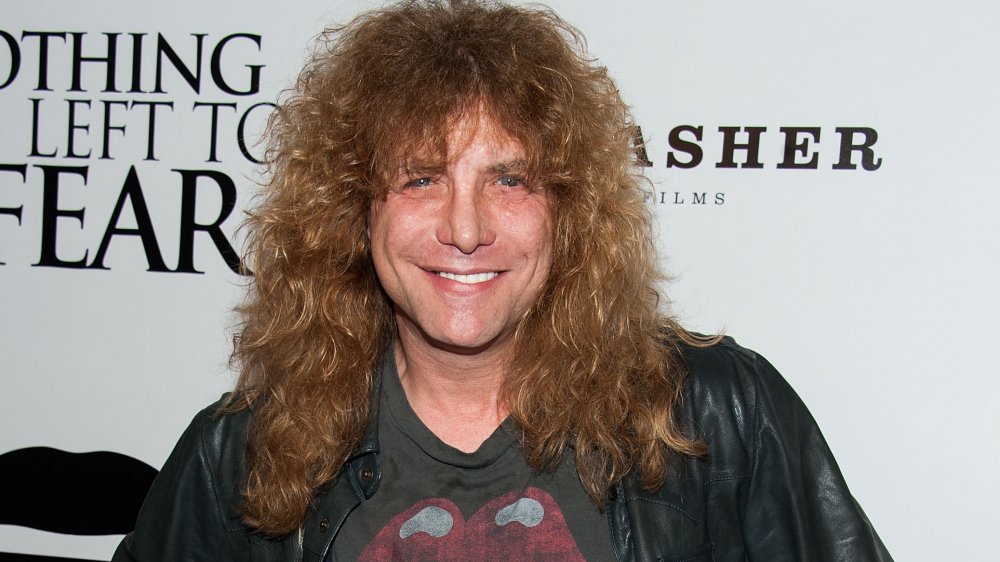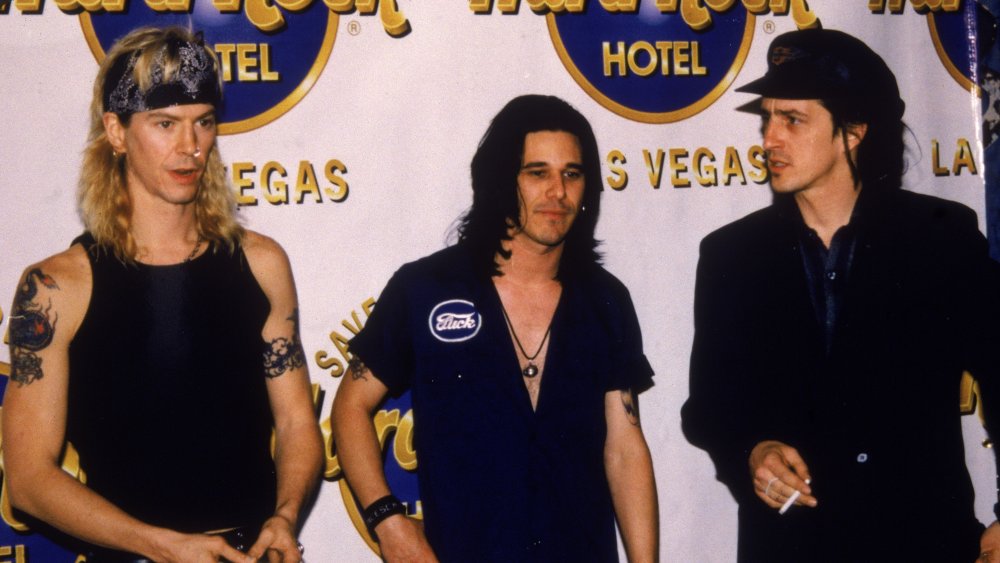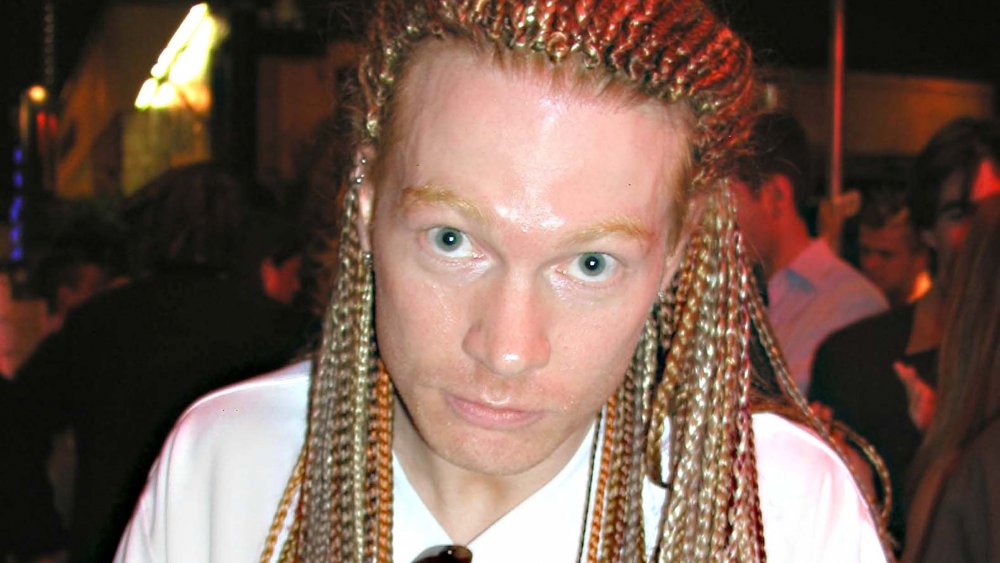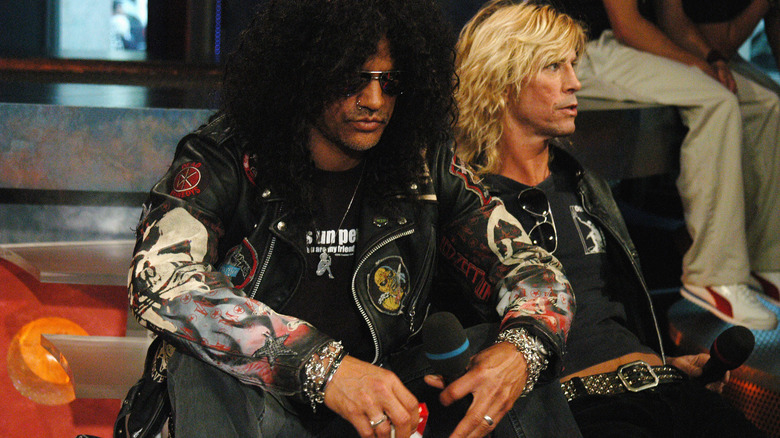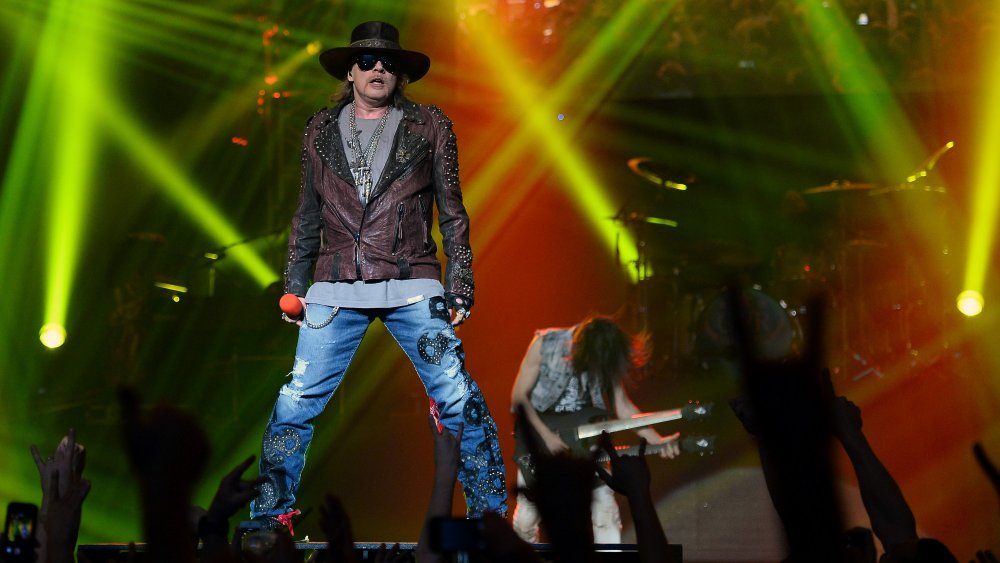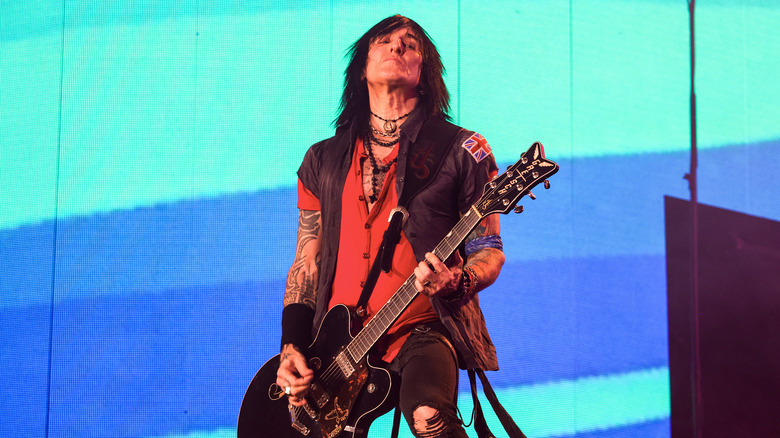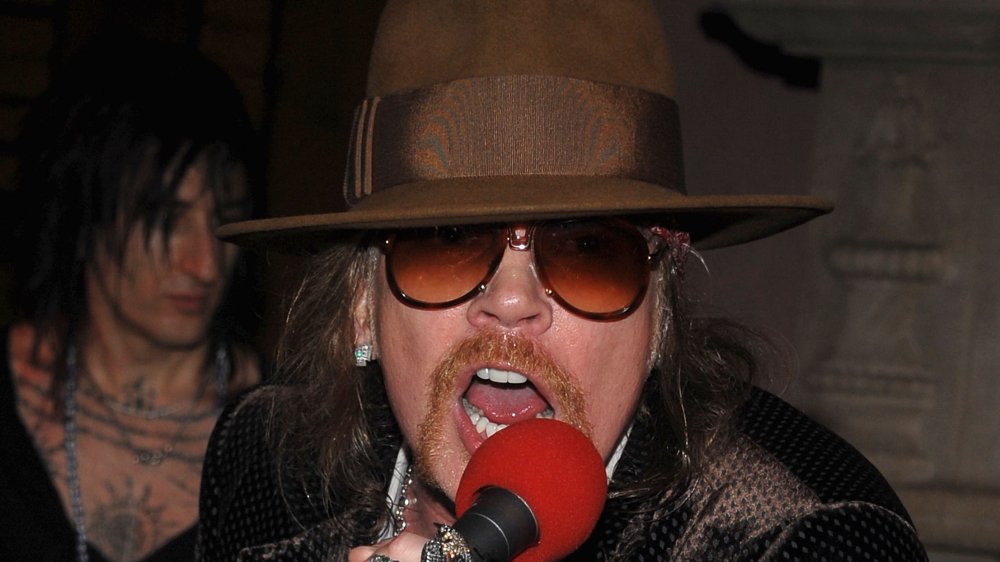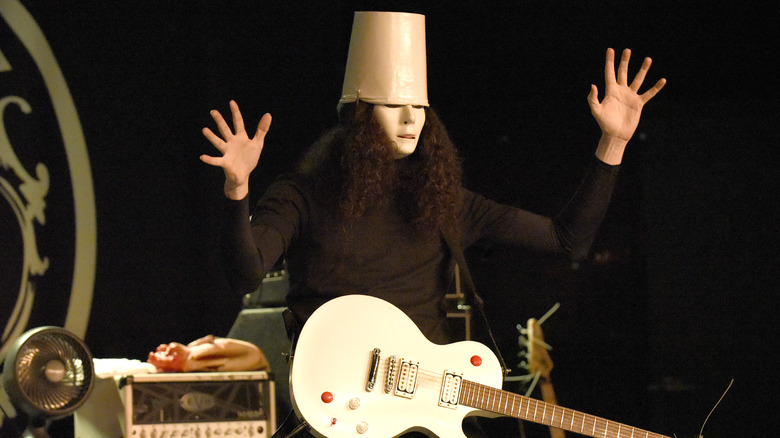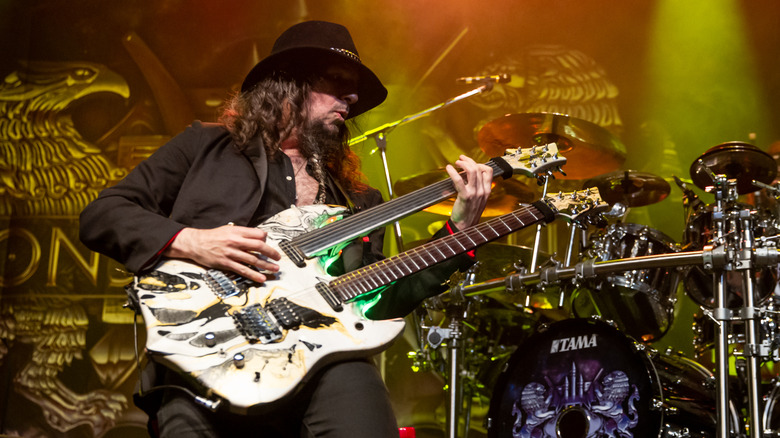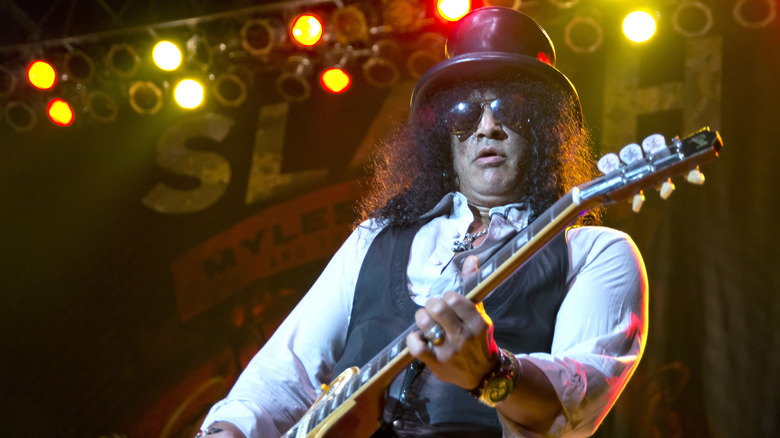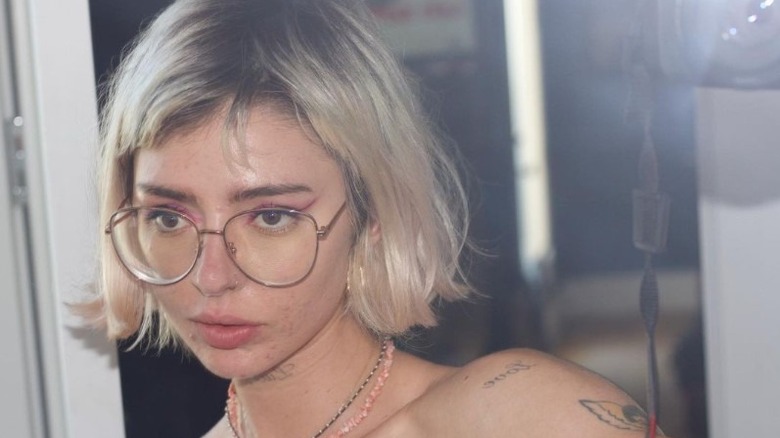The Tragic Real-Life Story Of Guns N' Roses
Throughout much of the 1980s, rock music was in rather dire straits. At the top of the charts, you'd find synth-pop hits and the glam metal balladry (emphasis on the glam) of Bon Jovi and Poison, groups who got paid like rock stars but had none of the street cred. Underground, you'd find raw, heavy music, played by the likes of Metallica and Slayer, who had the respect of the headbangers but none of the mainstream commercial appeal.
Then came Guns N' Roses and their titanic 1987 debut, "Appetite for Destruction," an album full of blues- and punk-influenced hard rock that had all the chart-topping catchiness of their hair metal contemporaries but none of the corniness that deprived those groups of respect. The band was raw. Its members were unpredictable. They were dangerous. They were real. But they were only those things because they wrote and played from the heart, pulling lyrics from experiences rooted in addiction and pain, poverty and abuse. They lived it. They earned it. And when they made it, massive egos threatened to burn it to the ground. This is the tragic, real-life story of one of history's last great rock bands.
The classic-era members were troubled kids from broken homes
This one is perhaps as unsurprising as it is tragic, but each and every single one of the "Appetite for Destruction"-era band members came from a broken home. Drummer Steven Adler's father left the family when Adler was a kid. His resulting problematic behavior forced his mother to send him to his grandparents in Hollywood, where he met Saul Hudson. Hudson, popularly known as "Slash," was also the child of divorced parents. They'd split in 1974 after years of trying to hold a marriage together while in separate countries. Like Adler, Slash neglected school and indulged in unhealthy substance use.
Also like Slash, Adler fell in love with rock music. Naturally, the two decided to form a band. It never materialized, but they did search for a bassist long enough to meet one Michael "Duff" McKagan, a Seattle punk transplant who was also a product of divorce with a passion for music and a penchant for excessive drinking. Meanwhile, Indiana natives Jeffrey Isbell (better known as Izzy Stradlin) and childhood friend William Bailey (Axl Rose) were also the products of broken homes. Stradlin's parents divorced when he was in elementary school, and Rose's when he was only two. Rose is no stranger to tragedy; he has described his childhood home as intensely religious, and he claims he and his siblings endured regular beatings and sexual abuse as children.
The founding members of Guns N' Roses were often in failed bands with each other
LA's Sunset Strip was, in the mid-'80s, a scene of both ascendant rock 'n' roll glory and shattered dreams. For every Ratt or Poison that went on to multi-platinum success, there were countless bands that called it a day after getting nowhere. Guns N' Roses is arguably the most legendary band to break out of this scene, but its constituent members were in multiple failed bands before forming their most famous group.
For example, Road Crew, consisting of Slash, Steven Adler, and Duff McKagan, briefly sought a singer but disbanded in less than a year with no releases. Slash and Adler would later join Hollywood Rose, in which both Axl Rose and Izzy Stradlin were playing. However, despite having four of GNR's later five classic members, this group would also fall apart before achieving any notable success.
Then, Rose and Stradlin would go on to join L.A. Guns. Unlike Road Crew and Hollywood Rose, L.A. Guns would, in fact, get a record deal and achieve moderate success at the tail end of the decade (without either Rose or Stradlin). However, like Road Crew and Hollywood Rose, they're far more famous for being the band that contained future members of Guns N' Roses.
The band's original bassist died at the young age of 36
Guns N' Roses welcomed a number of musicians over the years as the band lineup turned into something of a revolving door. One of the often-forgotten members was Danish musician Ole Beich, who served as the band's first official bassist. Speaking about Beich to Ultimate Guitar, original GNR guitarist Tracii Guns explained how Beich left Denmark to move to Los Angeles in 1982, joining L.A. Guns at first. After that group fell apart, Beich continued down the rock 'n' roll path to become a full-fledged Gunner. However, as someone who had played with Mercyful Fate and other heavy metal bands, GNR's music wasn't quite to his taste.
"I think Ole was the first to go," Guns said. "He really wanted to play metal, and we had turned into more of a blues-influenced heavy rock band with a little bit of tinge of glam rock in there. And he didn't really want to do that, he wanted to do something else. Unfortunately, he never found what he was looking for."
In 1991, news broke of the tragic death of Guns N' Roses' original bassist. According to The Music's Over, Beich died at the age of 36 after drowning in a lake in Copenhagen, Denmark. According to Guns, "[Beich] battled depression." Guns paid tribute to his former bandmate, stating that he "really loved that guy — very serious guy, had a great sense of humor. He helped me with a lot of things."
Guns N' Roses' first tour was called the Hell Tour for a reason
After forming Guns N' Roses in 1985 and having a few practice sessions, the boys decided to launch their first West Coast tour, using booking connections Duff McKagan had made during his time in Seattle. However, the absence of a working vehicle, money, ticket sales, assurances the gigs would even happen, or any reputation made for a rough time. The car the band did have, into which they packed all their gear, broke down a few hours north of LA and left them stranded. Unwilling to wait for repairs, they decided to abandon their heavier equipment and hitchhike to as many gigs as they could get to.
When they got to Seattle, naturally, none of the very few patrons present in the bars they played in were interested in this scrappy, no-name outfit that reeked of beer and sweat. Unimpressed with the lack of business the band drew in, at least one club owner refused to pay until the boys cornered him in the back office and threatened significant bodily harm. The band then had to hitchhike back to LA with barely enough money for gas station food to get them there. However, several members have since cited the challengers of the so-called "Hell Tour" as what cemented their camaraderie.
Guns N' Roses was desperately poor in the early days
The Hell Tour may have been a brief baptism of fire for the band, but it wasn't exactly smooth sailing upon their return to LA. They had each other's backs but no reputation, no money, and few connections. In short, they had to build a following from scratch. In his autobiography, simply titled "Slash," the guitarist explained that groups without a proven track record of success, like Guns, had to pay for club slots, exhausting much of the funds the band did collect at various odd jobs and forcing them to turn elsewhere for food and shelter. Exotic dancers were a popular source for both. They'd feed and house the band whenever they didn't have couches to sleep on.
The group did manage to later rent a number of tiny spaces in which to crash and practice, but these places quickly became neighborhood hubs for out-of-control debauchery. Parties raged on into the wee hours of the morning and spilled into the surrounding streets, attracting frequent police attention. Still, the band's financial problems persisted until they signed a lucrative deal with Geffen Records.
Two kids died at a Guns N' Roses concert in 1988
"Appetite for Destruction," the band's 1987 debut, took the world by storm when monster hits like "Sweet Child O' Mine" and "Welcome to the Jungle" began getting regular radio and MTV video rotation roughly a year after its release. In Mick Wall's "W.A.R.: The Unauthorized Biography of Axl Rose," the manager of Aerosmith (for whom Guns was opening in 1988 when "Appetite" topped the charts) said, "They basically just exploded. We were all p****d that Rolling Stone showed up to do a story on Aerosmith, but Guns N' Roses ended up on the cover of the magazine. Suddenly, the opening act was bigger than we were."
Months later, Guns N' Roses co-headlined England's Monsters of Rock festival. During Guns' performance, a moshing crowd of more than 100,000 repeatedly rushed the gate near the stage, risking a human crush. Axl Rose repeatedly stopped the set to demand they take several steps back. However, the music ultimately continued, and so did the chaos. After their set, the band learned two fans had indeed been killed. The group was devastated, but the media blamed them for the tragedy and slapped them with the moniker of "the most dangerous band in the world."
Axl Rose humiliated his heroin-addicted bandmates on stage
In 1989, while Guns N' Roses was opening up for the Rolling Stones in Los Angeles, Axl Rose took his frustrations to the crowd. "I hate to do this on stage," Rose said, according to Ultimate Classic Rock, "but I tried every other f*****g way. And unless certain people in this band get their s*** together, these will be the last Guns N' Roses show you'll f*****g ever see. 'Cause I'm tired of too many people in this organization dancing with Mr. G*****n Brownstone [a reference to heroin addiction]."
Slash swallowed his pride and apologized for his drug use at the next show, wanting to prevent the group from imploding at the height of its fame. Behind the scenes, however, the band was enraged at its singer for airing its dirty laundry in front of 70,000 fans. "It was probably one of the things that made me hate Axl more than anything," Slash later commented. As for Duff McKagan, he said, "I shrank, I was so f*****g embarrassed. Once Axl took his concerns public, the times of being a gang — us against the world — were over."
Guns N' Roses was no stranger to controversy
By the end of 1988, Guns N' Roses was one of the most popular bands on the planet. But with limitless money and fame came just as much (often unwanted) media attention. The group released "G N' R Lies" at the end of the year, featuring the Top 10 single "Patience," still a staple of the band's live sets. However, it also featured "One in a Million," with lyrics considered shocking and bigoted even at the time. (Let's just say Rose spent years dodging accusations of racism and homophobia.)
Then in 1989, rhythm guitarist Izzy Stradlin, drunk, was arrested for urinating on a crowded plane. (He ultimately got a year's probation.) In early 1990, Guns N' Roses won twice at the American Music Awards, and Slash and Duff McKagan, thoroughly drunk, accepted both ... and dropped a series of F-bombs on live TV that led to their mics being cut. This was all in addition to ongoing coverage of the Monsters of Rock disaster, as well as bar fights, assaults, arrests, and even a proposed parking lot brawl between Rose and Mötley Crüe's Vince Neil over an allegation that Stradlin had struck Neil's wife at a nightclub. The fight never happened, but the incident was the opening salvo in a long-running feud between Neil and Guns N' Roses.
Steven Adler was fired for drug addiction
If you're shocked it was even possible to get fired for excessive drug use in a band notorious for that very thing, you're not alone. But it really happened.
The band had been alarmed at Steven Adler's deteriorating condition for some time before they pulled the trigger. In 1990, the group returned to the stage after a break for what was supposed to be the warm-up show for a tour promoting their upcoming albums, "Use Your Illusion I" and "II." Adler, seemingly high, stumbled on the way to the drum riser in front of the whole crowd, humiliating and enraging a band that was quickly losing patience with him.
It was the last show he'd ever play with Guns. In the studio, things weren't much better, and Adler himself admitted to Classic Rock (via Here Today... Gone to Hell!) that he tried 20 or 30 times to record the single "Civil War." In July 1990, he was formally fired, and Matt Sorum, then drummer for the Cult, replaced him. In 1991, Adler sued the band for misleading him in various contracts, and he was awarded a substantial out-of-court sum.
The Use Your Illusion Tour was a bloated, mismanaged behemoth
The "Use Your Illusion" double album was released in 1991 to instant success and enormous fanfare. According to The New York Times, industry expectations put it on the same level as a Michael Jackson release. It largely delivered, too, selling 500,000 copies in two hours and having since sold a combined 14 million copies in the U.S. alone. With Matt Sorum on the kit and keyboardist Dizzy Reed added to the roster at Axl Rose's insistence, the band embarked on a two-and-a-half-year-long world tour that was fraught with controversy.
For example, Rose has been blamed for inciting riots at the band's shows — both the 1991 Riverport Riot in St. Louis and another one in Montreal, where GNR shared a bill with Metallica — that resulted in injuries, arrests, and costly property damage. Then there were the late starts where Rose enraged the crowd by taking the stage hours after the band was scheduled to perform. And then there were the mid-set storm-offs by, you guessed it, Axl Rose — just some of the controversial moments the singer will probably never live down.
But things only got crazier from there. Izzy Stradlin, newly sober and unable to take the pressure and unending madness, left the band in 1991 (he was replaced with Gilby Clarke), while Duff McKagan, Sorum, and Slash sank further and further into an abyss of alcohol abuse. Behind the scenes, late fees, police coverage, and excessive partying ensured the tour stayed heavily over budget and barely profitable for its duration.
Axl Rose forced everyone else out of Guns N' Roses
By 1992, the success of Nirvana had ushered in the grunge era and the end of bloated '80s glam rock. Guns N' Roses, themselves often considered the antithesis of glam metal and far more popular than most of the bands associated with the subgenre, had survived the initial hair-band culling in the early '90s. But by the time the "Use Your Illusion" Tour finally lumbered to an end in 1993, even GNR couldn't escape the fact that the music world had changed forever.
They released "The Spaghetti Incident?," a collection of punk rock covers, in late 1993, to lukewarm success. After that, clashing egos and dwindling relevancy led to intense turmoil in the ranks. Axl Rose, increasingly acting like a corporate boss, reportedly strong-armed the other members into signing over the rights to the band's name to him alone, according to Rolling Stone (via Here Today... Gone to Hell!). He then fired Gilby Clarke and replaced him with Paul Tobias, with whom Slash said he had no musical chemistry and intensely disliked, per Ultimate Classic Rock. In 1996, Slash, frustrated with Rose's demands and the band's inability to record new music, quit the group. Duff McKagan also left the following year, and Rose fired Matt Sorum. By 1998, Rose was the only original member remaining.
Addictions nearly killed multiple members of Guns N' Roses
Steven Adler had spent the majority of the '90s plummeting further into drug addiction, even being arrested in 1995 for felony heroin possession. The next year, he suffered a stroke that permanently affected his speech, according to Classic Rock (via Here Today... Gone to Hell!). In the years since, drug-induced depression led him to attempt suicide on a number of occasions. Thankfully, he's currently doing well.
Duff McKagan, after years of heavy drinking, nearly died in 1994 when his pancreas effectively exploded, leaking digestive enzymes into his body. To survive, he got sober and healthy.
Slash briefly died from a heroin overdose during the "Use Your Illusion" Tour, but he was revived. In 2001, at age 35, he was diagnosed with congestive heart failure and given a month to live. However, he too sobered up in the nick of time, and with the help of a surgically implanted defibrillator, he's long since cleared his expected expiration date. Years later, after getting pneumonia at a Cher concert he attended and being forced off cigarettes for several weeks to recover, he decided to ride the momentum and kick that habit for good, too. As of today, every Guns N' Roses member except Ole Beich is alive and well, despite having done everything in their power to kill themselves with debauchery.
Chinese Democracy has a weird reputation
After leaving Guns N' Roses, Slash, Duff McKagan, and Matt Sorum formed Velvet Revolver. Izzy Stradlin formed the Ju Ju Hounds. Steven Adler played in several bands, like the ongoing Adler's Appetite. Axl Rose, meanwhile, who'd grown increasingly reclusive, soldiered on with his version of Guns N' Roses. His constant hiring and firing of various studio musicians such as guitar virtuoso Buckethead, the Replacements' Tommy Stinson, and Nine Inch Nails' Robin Finck led to many characterizing the band as a never-ending "revolving door" of "hired Guns."
The band was also continuing forward with plans to eventually release the long-awaited follow up to the "Use Your Illusion" records, titled "Chinese Democracy." However, the album was constantly being tinkered with, partially shelved, added to, and delayed. After it was finally released in 2008, it received fairly positive reviews and sold a few million copies. But it's legacy is far more centered around its outrageous costs, the inexcusable amount of time it took to release, and the eccentricities of Axl Rose during this period.
Their guitarist endured a serious motorcycle accident
Time deceives, and while most fans associate Slash with the guitar position in Guns N' Roses, Richard Fortus has shredded for the act for over two decades now. Joining the band in 2002, he is officially one of the longest-serving members of the group after Axl Rose and Dizzy Reed. While the GNR gig keeps him busy on regular trips to Paradise City, he still finds the time to lend his six-string talents to other bands, such as the Dead Daisies, which also featured several GNR members.
However, in September 2015, the Dead Daisies posted the disappointing news that Fortus wouldn't be joining them for an Australian tour. Hopping onto his Facebook page, Fortus explained the valid reasons for his absence, writing: "On September 17, 2015, I was involved in a motorcycle accident. As a result, I broke my shoulder blade, collar bone, six ribs, [and] a toe. I have a bruised lung, lacerated liver and a concussion."
While the list of injuries sounds horrific and painful, Fortus added: "Amazingly, my doctors have assured me that I will make a full recovery." He expressed his disappointment about missing the tour, though, stating how it was the first time in his career that he would miss a show — never mind a tour. That said, Fortus made a full recovery from his injuries and continues to tour with GNR.
Axl and Slash fought through the media
Axl Rose may have wanted everyone to see him and him alone as the band's single essential member. But the departures of his bandmates clearly weighed heavily on him. He and Slash maintained a widely publicized feud for years, often taking shots at each other through the media. In 2005, Slash and Duff McKagan, then playing with supergroup Velvet Revolver, sued Rose for allegedly claiming sole copyright distribution rights to the band's catalog, according to Billboard. The next year, Rose countered with his own lawsuit, claiming their suit "attacks [his] integrity as Slash and Duff, in a vindictive attempt to aggrandize their own stature, rewrite history through false statements, which have been repeated by the media" (via Blabbermouth).
The feud continued on and on. Slash alleged Rose had seized control and tried to have him sign a new contract before he quit. In an interview with Spinner (via NME), Rose infamously called Slash a "cancer" that's "better removed," and in 2009, he told Billboard that one or both of them would die before a reunion. As the years dragged on, though, Slash later characterized the feud as largely having been a media fabrication, and he maintained a never-say-never stance when asked about a possible reunion. His attitude paid off — Slash rejoined Guns N' Roses in 2016, and in 2019, the band's "Not in This Lifetime ..." Tour became one of the highest-grossing tours in history. (Speaking of Slash, this is where Slash got his nickname.)
Buckethead experienced a heart condition
Many fans wonder: What is Buckethead from Guns N' Roses up to now? The outrageously talented guitarist who performed with a KFC bucket over his head certainly left a mark on GNR, even if his time in the band was only a short-lived four years. Buckethead was certainly a character, and not many people knew who the person under the bucket was. However, in 2017, Buckethead peeled back the layers to reveal more of the man behind the act: Brian Carroll.
Speaking on the "Coming Alive" podcast (via Spin), Buckethead discussed a medical matter related to his heart. The musician explained how he had dealt with a condition where his "heart beats out of rhythm." While Buckethead expressed it wasn't something new, it became progressively noticeable and "really intense." He added: "So I went to the doctor and they said, 'Oh, you're on the verge of having a stroke.' I'm like, 'Ohh.' Because I felt so good prior to having it, I was doing pretty well and everything."
Buckethead underwent a treatment called cardiac ablation and received medication; however, he still felt the effects of the condition. "I had that procedure, and it didn't really stop it, and I'm still dealing with it," he said. "It's been really difficult, because it's scary, and it comes on ... Even walking across a room is difficult." The musician expressed how the experience was an eye-opener about how precious time is and spurred him on to do all the things he wanted to do.
A former guitarist attempted suicide
Ron "Bumblefoot" Thal served as a guitarist in Guns N' Roses for almost a decade from 2006 to 2014. In 2011, Bumblefoot was involved in a car accident that left him with significant injuries, as he revealed to journalist Mikkel Elbech (via Here Today... Gone to Hell!) in 2013. He explained how he had nerve damage in both his arms and dealt with severe amounts of pain, but he made the decision to get back in the saddle and tour with GNR.
He added that he wasn't in the best space — both physically and mentally — at the time and attempted suicide while on tour in 2011. "I'm not a drinker, but I tried to drink myself to death," he said. "In the hotel room in New York. And, just ... didn't tell anybody that my goal was to die."
Bumblefoot explained how the period after the accident proved to be tumultuous and life-changing for him, but he eventually found help. "After a year I had to go through a 112-day, very strict cleanse to get all the drugs and residue and everything out of my body," he said. "And I had to start reading, as part of that cleanse, a lot of books from Indian gurus, and Richard [Fortus] would actually recommend lots of books for me and all kinds of things to help."
A fan died in a bus crash on the way to one of their shows
No matter the time or era, Guns N' Roses never struggles to sell out shows across the globe. However, the return of the beloved Slash and Duff McKagan to the fold in 2016 ensured that any gig would be simply unmissable now. The gang (or at least most of them) was back together, and fans traveled from far and wide to catch the rock 'n' roll legends live and in the flesh.
In April 2016, GNR performed in Mexico City, Mexico, as the audience descended on the capital city for a special show. Tragedy struck, though, when a bus crash claimed the life of one fan and injured many others on the way to the concert. As per Excelsior, a bus driver lost control of the vehicle and overturned it on the Mexico-Querétaro highway. A 35-year-old passenger named Mauricio Ballesteros Zamora died, while nearly 30 others were injured in the accident.
Taking to X (formerly known as Twitter), the band posted a sentimental message, expressing their sympathies and condolences for what happened. The statement read: "We in Guns N' Roses are shocked and extremely saddened to hear of the horrifying bus crash en route to our Mexico City show yesterday. Our thoughts and hearts are with the family of Mauricio Ballesteros Zamora. We are so very sorry for your loss. We hope for a speedy recovery to the 29 other injured fans. God speed."
Slash's stepdaughter died
Slash and Meegan Hodges dated in the late '80s before finding their way back to each other in the mid-2010s, as per the Los Angeles Times. During their time apart, Hodges had a daughter with Mark Knight named Lucy-Bleu Knight who was born on December 6, 1998. On July 21, 2024, tragic news broke on both Slash and Hodges' Instagram accounts, regarding the death of Lucy-Bleu who had passed away on July 19. The family asked for privacy and space to cope with their loss.
Speculation about the cause of death mounted after what appeared to be a scheduled post was published to Lucy-Bleu's Instagram account on July 22 — three days after her death. The message read: "Whether I made you feel excluded, manipulated/controlled you, told you to quit your day job from the comfort of being financially supported by my parents, or drowned real issues in toxic positivity — I am sorry. Countless missed opportunities and connections due to a disgustingly big ego, insecure heart and fear of being vulnerable. May my soul learn to evolve from my poor job at being Lucy-Bleu. Peace." In the comments section of the post, Lucy-Bleu's mother replied, professing her love for her daughter and saying, "I'm so sorry."
In a press release sent by the Prime PR Group on behalf of the family, the request was "in lieu of flowers and gifts, donations may be made to National Alliance of Mental Illness (NAMI)."
If you or anyone you know needs help with addiction issues, may be the victim of child abuse, or is struggling or in crisis, contact the relevant resources below:
- Visit the Substance Abuse and Mental Health Services Administration website or contact SAMHSA's National Helpline at 1-800-662-HELP (4357).
- contact the Childhelp National Child Abuse Hotline at 1-800-4-A-Child (1-800-422-4453) or contact their live chat services.
- Call or text 988 or chat 988lifeline.org
